- Home
- Lois Lowry
Anastasia, Absolutely
Anastasia, Absolutely Read online
Anastasia, Absolutely
Lois Lowry
* * *
Houghton Mifflin Company
Boston
* * *
Library of Congress Cataloging-in-Publication Data
Lowry, Lois.
Anastasia, absolutely / by Lois Lowry.
p. cm.
Summary: More adventures of thirteen-year-old Anastasia Krupnick
as she tries to deal with a new dog, her school values class, and a
personal moral dilemma.
ISBN 0-395-74521-7 (he)
[1. Values—Fiction. 2. Schools—Fiction. 3. Friendship—
Fiction. 4. Dogs—Fiction. 5. Humorous stories.] I. Title.
PZ7.L9673Alb 1995 95-9710
[Fic]—dc20 CIP
AC
Copyright © 1995 by Lois Lowry
All rights reserved. For information about permission
to reproduce selections from this book, write to
Permissions, Houghton Mifflin Company, 215 Park
Avenue South, New York, New York 10003.
Printed in the United States of America
QUM 10 9 8 7
* * *
Books by Lois Lowry
Anastasia Krupnik
Anastasia Again!
Anastasia at Your Service
Anastasia, Ask Your Analyst
Anastasia on Her Own
Anastasia Has the Answers
Anastasia's Chosen Career
Anastasia at This Address
All About Sam
Attaboy, Sam!
The One Hundredth Thing About Caroline
Switcharound
Your Move, J.P.!
A Summer to Die
Find a Stranger, Say Goodbye
Autumn Street
Taking Care of Terrific
Us and Uncle Fraud
Rabble Starkey
Number the Stars
The Giver
1
"Anastasia!"
"Hunh?" Anastasia opened her eyes groggily. Her bedroom was dark and she couldn't remember at first what day it was. But she recognized the voice. It was her mother's voice, and it was angry.
There was another sound, too—a kind of crying, as if someone had left a baby on the doorstep. Great, Anastasia thought, as she sat up in bed; that's all we need: a baby on our doorstep, with a pathetic little note pinned to its undershirt.
"Anastasia" Her mother was at the foot of the stairs that led to Anastasia's third-floor bedroom. "Wake up!"
"I'm awake," Anastasia called. "What's going on? What's that crying?" She went to the top of the stairs, looked down through the dim light, and saw her mother standing there in the over-sized Harvard sweatshirt she usually wore instead of a nightgown.
"That crying is your dog, remember?" her mother asked loudly. "Your dog that you are going to take care of, that you are going to get up with every morning, remember? You promised, Anastasia. You promised at least forty times before we agreed to take on this dog, and last night after dinner you promised once again!"
"Yeah." Dog. Yes. Dog. Now she remembered.
"Today," Mrs. Krupnik called, as the whining and crying became louder, "is the first day of the rest of your life."
"I know! I'm coming!" Quickly Anastasia reached for her glasses and a pair of sweatpants that were draped on a chair. She pulled them on over her pajamas, found some dirty socks on the floor, and pulled those on as well.
"Here I am!" She dashed down the stairs from her third-floor room. "I'm sorry. I didn't hear him at first. Actually, I heard him, but I thought somebody had left a baby on our doorstep."
"A what?"
"A baby, with a note saying 'Please take care of me.'"
Her mother stared at her for a moment, and then shook her head. "I am going back to bed," she announced wearily, and headed back toward the bedroom where Anastasia's father was still asleep. Anastasia could see him there, a big mound under the blankets.
"What's that scary noise?" Sam's voice came from his bedroom. Anastasia poked her head through his half-opened door and said soothingly, "Shhh. Go back to sleep. It's just the dog."
Sam, who was sitting up in bed, lay back down, rolled over, and closed his eyes. M rs. Krupnik had gone back into the master bedroom and closed the door. The mound that was Anastasia's father hadn't moved. Myron Krupnik slept through everything. He complained that he missed a lot of interesting stuff because of it. Just last month their neighbor, Mr. Fosburgh, who couldn't seem to quit smoking even though he had tried about four hundred times, had set fire to his living room curtains and three fire engines had come with their sirens full blast. It was the most exciting event in their neighborhood in years, and Myron Krupnik had slept through the entire thing.
It was truly amazing, though, Anastasia thought, that Dad was sleeping through this. The dog was howling now, and he was scratching loudly at the door to the room where he was confined, the little unused room at the end of the second floor hall.
When the Krupniks had moved to this house the year before, they had argued about that room.
"It's a sewing room," Anastasia's father had said.
"Excuse me?" his wife replied. "A sewing room? Did you intend that I be enclosed up there, maybe stitching fine linen shirts by hand for my master, or darning his socks and underwear? Am I hearing you correctly?"
Myron Krupnik had backed off quickly. "No," he said. "I lost my head. It is definitely not a sewing room."
"Maybe it could be a workroom for Dad," Anastasia suggested. "For his hobbies."
Her parents had looked at her quizzically. Her father was an English professor. On the first floor of the house was a large bookcase-lined study, where her father sat often in the evenings, reading, correcting papers, listening to music.
"What hobbies?" her father had asked, with a very curious look.
"Ah, woodworking?" Anastasia suggested tentatively.
"Woodworking?" Mr. Krupnik didn't sound irritated, just puzzled.
"Making birdhouses and stuff?"
"Birdhouses?"
"No, I guess not," Anastasia admitted. He was right. Her dad was not a hobbies kind of guy.
"Maybe it could be a hideout room," Sam had suggested.
They had all looked at him. "For if bad guys come," Sam explained, "and need a hideout? We could put them in there, and they could shoot their guns out the window." He aimed one of his fingers and made a few pft-pft shooting sounds.
No matter how often the entire family tried to deflect Sam's interest in guns, tried to direct him to peaceful ways of resolving conflict, he always found a way back to Uzis and bazookas. "No hideout, Sam," Mrs. Krupnik said firmly. "No bad guys. No guns."
"Well," Anastasia had proposed finally, "it would make a good room for a dog to sle—"
"No," her mother had said.
"No," her father had said.
"Rats," Anastasia had said.
But that had been a year ago. And now they had a dog, and now the little room had become The Dog's Room—because the dog didn't even have a name yet—and Anastasia had promised faithfully that she would feed the dog, train the dog, clean up after the dog, and walk the dog regularly, even early in the morning, though she had not realized until this minute that "early in the morning" might mean dawn, for pete's sake.
She opened the door to The Dog's Room. He leaped at her and licked her face.
"Hi," Anastasia said, and scratched him behind the ear. She yawned, the dog yawned, which made her yawn again, and then he scampered ahead of her, down the stairs, and stood waiting by the front door.
Funny, she thought, how this dog had never been in this house in his life until yesterday, but already he knew the layout. All by smell, too. He
had so much shaggy hair in his eyes that Anastasia was quite certain he couldn't see anything. But he sniffed incessantly, leaning his head down and making his way around by following his nose. During his first hour in the Krupniks' house, he had discovered some stale cheese crackers on Anastasia's desk and a moldy half of a tuna fish sandwich that Sam had wedged behind a radiator.
"Not me," Sam had said, when they showed him. "Bad guys did it."
Now the unnamed dog stood impatiently by the front door as if he had lived in the house all his life and knew exactly which way was marked EXIT. When he heard Anastasia jiggling his leash in her hand, he quivered with anticipation and made an excited whimpering noise.
Hurry up, hurry up, he was saying. My goodness, Anastasia thought in surprise. I can understand dog language.
"In a minute," she told him. "Let me put my jacket on."
He wiggled, and said again, Hurry up.
Anastasia zipped her jacket, attached the leash to his collar, and unlocked the front door.
"Ooops," she said. "Forgot something. Just a minute." She reached over and picked up the thick padded envelope on the hall table. "I promised Mom I'd mail this. It's her sketches for a new book. Boy, she'd kill me if I forgot. They're already late and the publisher's been bugging her about it. And guess what—the book's about a dog."
Pleeeeeze hurry, the dog said, nudging the door with his nose. He didn't seem to be interested in hearing about Mrs. Krupnik's illustrations.
"One more thing. Plastic bag for you know what." It was the gross part, but Anastasia had promised her parents that she would clean up after the dog. She opened the front door, picked up her father's New York Times from the front steps, and removed it from its blue plastic bag. She tossed the paper onto the hall table and put the crumpled bag into her pocket. She just hoped that no one would see her, especially not Steve Harvey, who was in her class at school and also lived down the street, as she packaged dog poop in a plastic bag. Talk about embarrassing.
Finally she was ready. With her mother's mail in one hand, the plastic bag in a pocket, and holding the leash firmly to restrain the dog, who was tugging hard, Anastasia started out on the first morning of the rest of her life. My Life with a Dog, she thought, and liked the sound of it.
She glanced back at the hall clock before she closed the front door.
Good grief. It was still just 6:08. Anastasia yawned again and headed down the front steps into the dawn.
***
"My goodness, isn't he cute? What kind of dog is he?"
Anastasia smiled politely at the woman. It was amazing how many people were actually out here at sunrise: some of them walking their dogs, others jogging. This woman was wearing a jogging suit and was carrying weights in her hands and walking very fast, though she had stopped now to admire Anastasia's dog.
"Well, he's really a mutt," Anastasia explained. "Mixed breed, the vet calls it. He's part poodle and part Tibetan, and part Wheaten, and ... I forget what else. But all the different parts are nonallergenic. My dad's allergic to dogs—and to cats, too—so we could never have a pet. My brother got a kitten and my dad promised to try not to sneeze, but he sneezed for five days straight, and now Sam's kitten has to live in the garage."
Suddenly Anastasia thought, I'm talking too much, as usual. Why don't I ever know when to shut up PI am going to concentrate on that part of my personality: learning when to keep my mouth shut.
But the woman did seem interested, so Anastasia went on.
"Then the vet called us—he's a friend of my dad's because they went to college together a million years ago—and said he had to find a home for this dog, and it was nonallergenic because it was a mix of lots of kinds of nonallergenic dogs."
The woman leaned over, shifted one of her weights to the other hand, and scratched the dog in the shaggy hair behind his ears. "What's his name?" she asked.
"He doesn't have one yet. We just got him. Actually, of course he had a name, but we're going to give him a new one. Only I have to think of just the right one."
"'Shaggy,'" the woman suggested.
Anastasia made a face. "Thanks. But I don't think so. It's a little too obvious."
"'Fuzzy'?"
Great. The woman was going to stay there all morning, entering a dog-naming contest.
"Well, I'll give that some thought," Anastasia said politely. "But we're trying to think of a name that would sort of sound like his old name, so that it will seem a little familiar to him." She tugged on the leash and pulled the dog away. He sniffed at a hedge, raised his leg tentatively, thought better of it, and trotted forward along the sidewalk.
The woman followed. "What's his old name?" she asked.
Anastasia sighed. She had been trying hard not to say the dog's previous name, because it was a stupid name and she wanted him to forget about it. But she didn't want to be rude. Finally, reluctantly, she whispered it to the woman. "Louie," she said, under her breath.
"Oh! So you need something with an oooo sound! How about 'Pookie'?"
"Thanks. That's really cute. I have to go now." Anastasia hurried along behind the dog, who was not under any circumstances in the entire world going to be named Pookie, and at last the woman waved and went away.
The sun was beginning to come up. Anastasia, approaching a corner where a brick building housed an insurance agency, exchanged smiles with a newspaper delivery person, two more joggers, and a man with two golden retrievers at his side. A woman with a tall thin dog on a red leash seemed very friendly. All of the people she passed did. They said things like "Good morning" or "Hi there" or "Nice day" or "Nice dog."
Actually, it was kind of fun becoming a morning person, Anastasia decided. And also, it gave you time to think. In real life, in the regular daytime hours, you never had time to think because you were so busy doing stuff.
And Anastasia needed to think. Back home, back on the desk in her bedroom, she had a school paper to write.
Many of the free periods that had been study halls or library time were now going to be devoted to Values, until Christmas. After Christmas Anastasia could go back to studying and reading and daydreaming and doodling again; but for now, from Monday to Friday each week, every single day, she would have to think about Values. She had groaned about it to her parents, but they hadn't been very sympathetic; they had pointed out that all human beings should be thinking about Values every single day of their life anyway.
The course had just begun, and the teacher, Mr. Francisco, had given them each a set of questions. Well, they weren't actually questions; they were sort of situations. Each of the students was supposed to write about how he or she would react in each situation.
Anastasia had thought it would be kind of boring and that she wouldn't have any problem with Values. After all, she thought, she'd been brought up in a family with very good values. She had been quite certain that she knew exactly how she felt in any given situation and what the right response was.
But some of Mr. Francisco's hypothetical situations were a little complicated. They made her confused. That was why she needed time to think.
She'd already completed her answer to the first question—about whether she would be willing to smash a small groundhog over the head with a rock if it meant that by doing so she would save a vegetable garden that would feed a poor family for an entire summer. But it hadn't been easy, and even now she wasn't sure that she'd made the right choice. She thought she'd have to rewrite her answer.
For the first time in her life, Anastasia realized that she had trouble making important decisions.
I am an indecisive person, she thought. Not only do I talk too much, but I am wishy-washy. It was depressing, having so many serious flaws.
While Anastasia mused about groundhogs, values, and character deficiencies, she also thought about a name for the dog. Clearly he couldn't go on very long without a name; it wouldn't be fair. Anastasia remembered when her brother had been born, three years before, and they chose his name the very first da
y, when he was just about four hours old. Of course they had had about six months to think about it.
But the dog had been a sort of surprise. The vet called about him; they went to see him; Myron Krupnik didn't sneeze or itch; and so they had taken the homeless dog home, stopping en route at the store to buy some food and a dish. It had been quite sudden, with no time to come up with a name.
The dog continued to trot, stopping here and there to sniff. It was astonishing how curious a dog he was, Anastasia thought. Maybe his name should be Sniffer.
No. Sniffer wasn't it; it didn't have the oooo sound that they needed.
Anastasia knew that when she hit on the right name, it would be clear to her at once, like a light bulb appearing over someone's head in a comic book.
The dog stopped again, at the corner, and examined a grassy square around a lamppost carefully.
Snoopy?
No. That name was, well, used.
Finally the moment came, the moment Anastasia had dreaded, the moment when she had to scoop. She glanced quickly around; the woman with the red-leashed dog was still nearby but looking in another direction. Luckily there were few people around. The main observer was the dog, who seemed very interested in the blue newspaper bag, as if he were thinking, Why on earth would you do that?
Anastasia was wondering the same thing. But dutifully, because she had promised her parents she would, she scooped the unattractively large and surprisingly steamy mound into the plastic bag that only thirty minutes before had held her father's New York Times.
Scooper? That was a name with an oooo sound.
No. No light bulb appeared.
Pooper?
No way.
Anastasia sighed. I'm so wishy-washy, she thought, that I can't even name a dog.
Fortunately no one was really watching while she scooped. She had dreaded scooping in front of onlookers. But there was one exception—a man who scowled at her. If he's that grouchy seeing me scoop it up, Anastasia thought, I wonder how he would have looked if I hadn't.
Flustered because the man was still looking—and because the dog had growled slightly at him, the only time she had ever heard a growl issue from the dog's mouth, but she didn't really blame him because he really deserved privacy in such circumstances, and it wasn't fair of the guy to look—Anastasia hastily mailed her mother's packet of sketches in the corner mailbox. Then she glanced at her watch, which said 6:32. Darn it. She decided reluctantly that she would not, after all, be able to go back to bed.

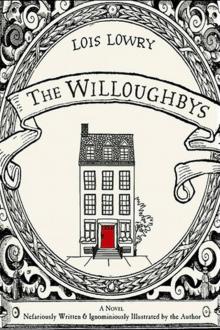 The Willoughbys
The Willoughbys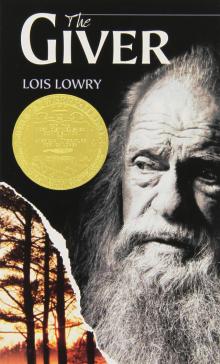 The Giver
The Giver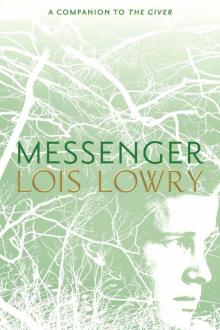 Messenger
Messenger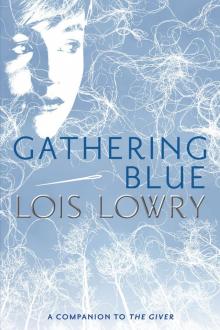 Gathering Blue
Gathering Blue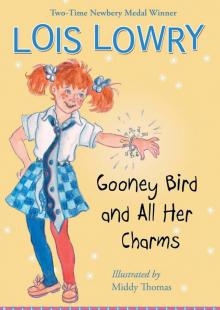 Gooney Bird and All Her Charms
Gooney Bird and All Her Charms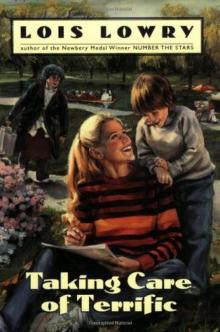 Taking Care of Terrific
Taking Care of Terrific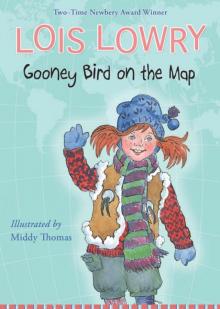 Gooney Bird on the Map
Gooney Bird on the Map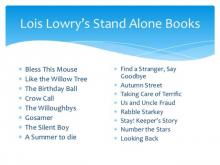 The Birthday Ball
The Birthday Ball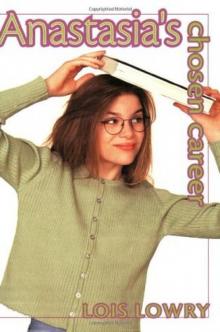 Anastasia's Chosen Career
Anastasia's Chosen Career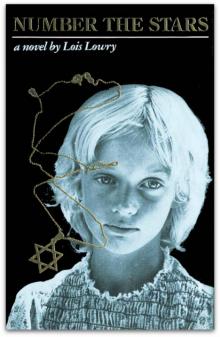 Number the Stars
Number the Stars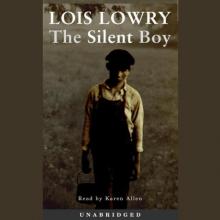 The Silent Boy
The Silent Boy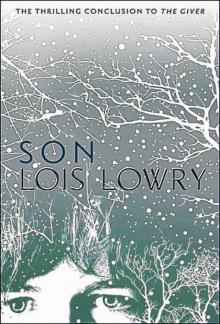 Son
Son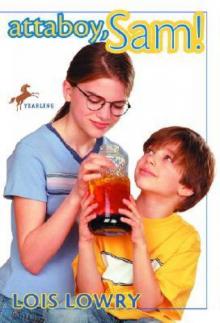 Attaboy, Sam!
Attaboy, Sam!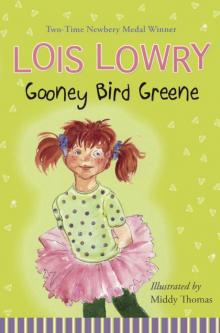 Gooney Bird Greene
Gooney Bird Greene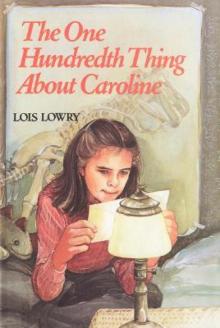 The One Hundredth Thing About Caroline
The One Hundredth Thing About Caroline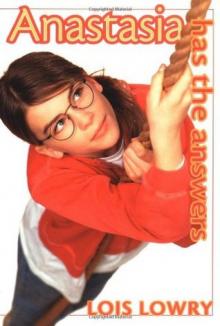 Anastasia Has the Answers
Anastasia Has the Answers Your Move, J. P.!
Your Move, J. P.!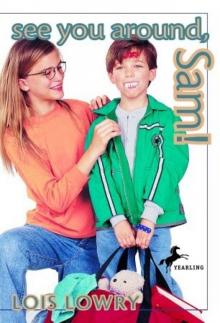 See You Around, Sam!
See You Around, Sam!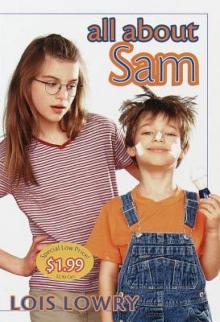 All About Sam
All About Sam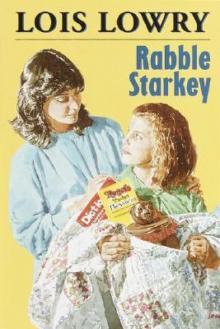 Rabble Starkey
Rabble Starkey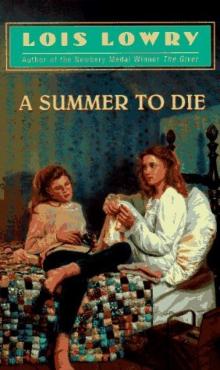 A Summer to Die
A Summer to Die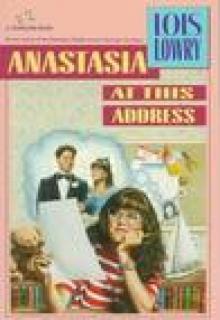 Anastasia at This Address
Anastasia at This Address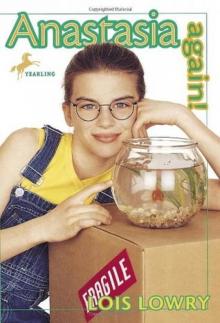 Anastasia Again!
Anastasia Again!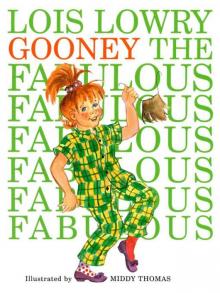 Gooney the Fabulous
Gooney the Fabulous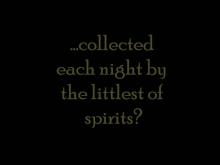 Gossamer
Gossamer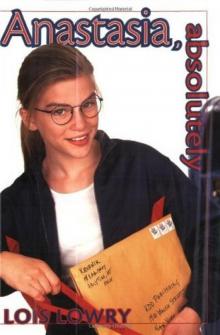 Anastasia, Absolutely
Anastasia, Absolutely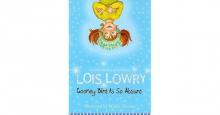 Gooney Bird Is So Absurd
Gooney Bird Is So Absurd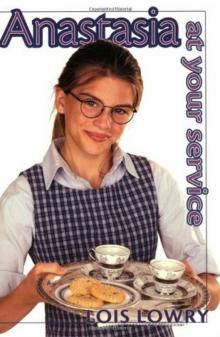 Anastasia at Your Service
Anastasia at Your Service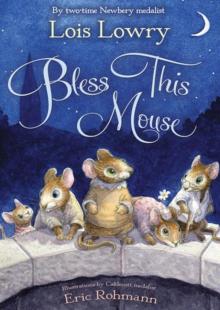 Bless this Mouse
Bless this Mouse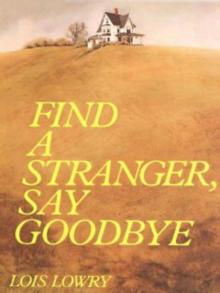 Find a Stranger, Say Goodbye
Find a Stranger, Say Goodbye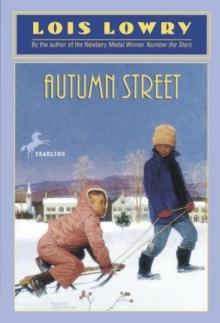 Autumn Street
Autumn Street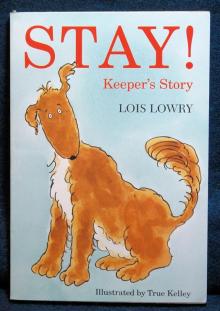 Stay Keepers Story
Stay Keepers Story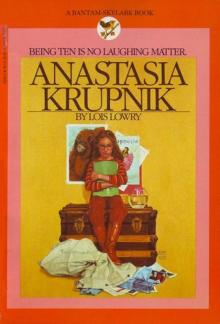 Anastasia Krupnik
Anastasia Krupnik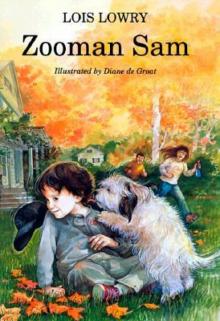 Zooman Sam
Zooman Sam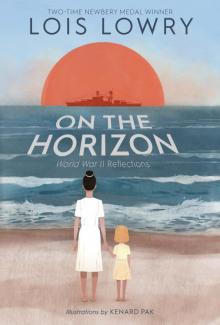 On the Horizon
On the Horizon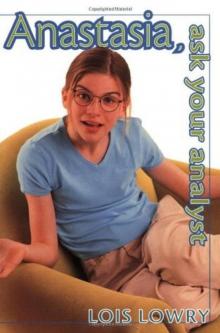 Anastasia, Ask Your Analyst
Anastasia, Ask Your Analyst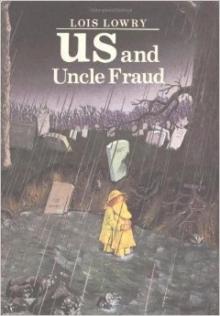 Us and Uncle Fraud
Us and Uncle Fraud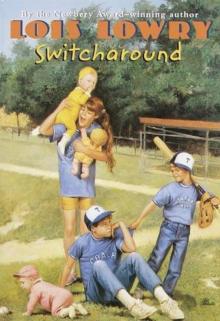 Switcharound
Switcharound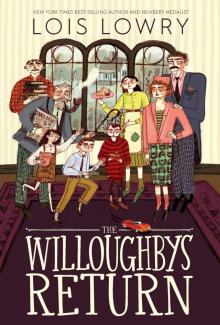 The Willoughbys Return
The Willoughbys Return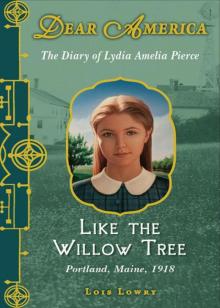 Dear America: Like the Willow Tree
Dear America: Like the Willow Tree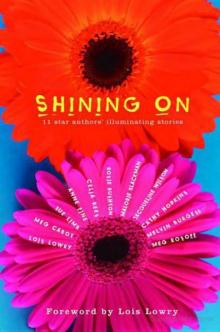 Shining On
Shining On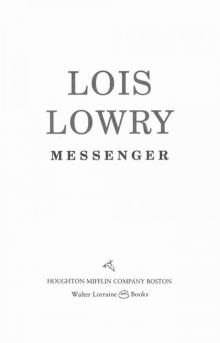 Messenger (The Giver Trilogy)
Messenger (The Giver Trilogy)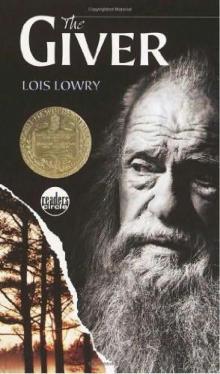 Giver Trilogy 01 - The Giver
Giver Trilogy 01 - The Giver